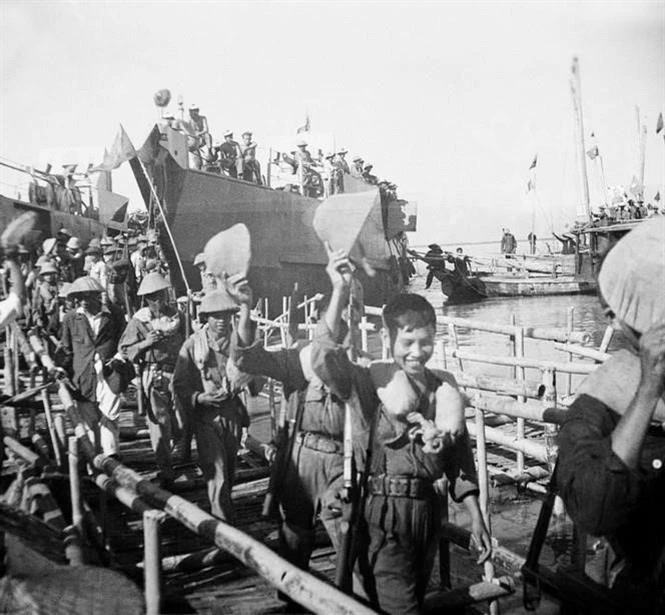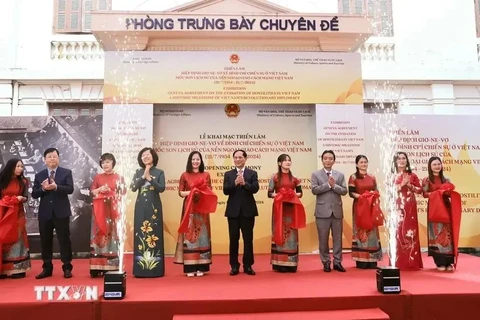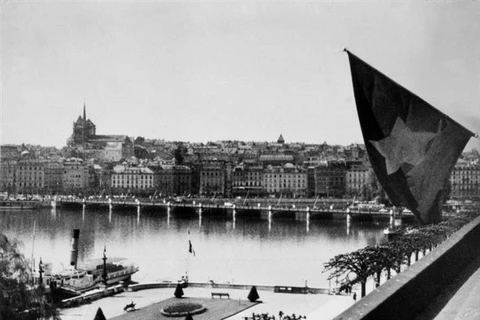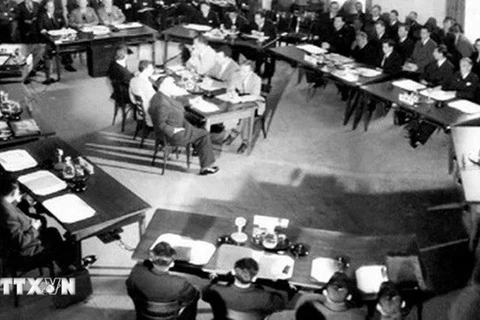
Hanoi (VNA) – Vietnam always treasures international support and solidarity to its glorious struggle for independence, Minister of Foreign Affairs Bui Thanh Son has expressed his deep appreciation as the country will mark 70 years of 1954 Geneva Agreement in the next few days.
The Geneva Agreement on the Cessation of Hostilities in Vietnam signed on July 21, 1954 contributed significantly to the successful conclusion of the Vietnamese people’s resistance war against the French colonialists.
“We will forever remember the pure solidarity, and support from revolutionary forces and people of Laos and Cambodia, as well as socialist countries and peace lovers worldwide to Vietnam during its struggle for national liberation and reunification,” Son emphasised in his remarks at a recent international gathering held by the Ministry of Foreign Affairs.
With the signing of the Geneva Agreement in 1954, Vietnam showed the world the country did not just win international support through official diplomatic channels but also getting help and encouragement from the general public of many countries.
President Ho Chi Minh and other Vietnamese leaders were able to maneuver gracefully the “people-to-people diplomacy”, contributing remarkably to the victory of the Democratic Republic of Vietnam at the Geneva Conference.

It was French people’s support to the Vietnamese Party, Government and people that became a crucial factor in the negotiations at that time, Australian Professor Carl Thayer pointed out.
“In 1953 when I was eight years old and living in France, there were public demonstrations against the war in Indochina. They called the war in Indochina “la sale guerre” (dirty war),” recalled Professor Thayer, a political expert best known for his profound studies about Vietnam.
According to the Professor, the Government of France, then facing a public increasingly disenchanted with the “la sale guerre”, was at the end of its electoral tether.
He cited a public opinion poll taken on November 21, 1953 showing that nearly 67% of respondents surveyed were in favour of either negotiations or a French withdrawal from Indochina.
During his journey to seek ways for national salvation, President Ho Chi Minh, a founder of the French Communist Party, was well aware of the importance of international support to national liberation efforts, Thayer noted. “The late leader of Vietnam penned many articles published on French newspapers, calling French people to back Vietnam’s just struggle”.
Pierre Asselin, Professor of History at San Diego State University, the US, shared the same view on the significance of diplomacy in national liberation movements. “Before and during the Geneva Conference, Ho Chi Minh and his Government waged a rather successful diplomatic struggle to win foreign friends’ support. I think this played an important role in forcing France to negotiate an end to the war”.
Many social organisations such as the Vietnam’s Women Union and the Vietnam General Confederation of Labour regularly dispatched their representatives to international conferences and forums where they called for international support for Vietnam’s battle for independence and at the same time, sending out a clear message that Vietnamese people would fight until their last breath to protect the independence and freedom of their country, just like French people did against German fascists.
France’s social-political organisations, including those of women and youths and trade unions, showed their acts of support in different forms, including collecting signatures to demand peace in Vietnam, convening meetings, and staging demonstrations across France, especially in big cities. Labourers in many French colonies in Africa like Algeria, Morocco, Tunisia and Madagascar also overtly showed their support in various forms.
Workers at ports in North Africa launched strikes protesting the transfer of weapons to the Southeast Asian nation. In Thailand, India, Indonesia, Myanmar and some capitalist countries such as West Germany, Austria and Australia, the support Vietnam movements spread rapidly.
Some international organisations like the World Federation of Trade Unions and the World Peace Council issued resolutions strongly condemning the French invasion and demanding an immediate end to the war and restoration of peace in Indochina.
Vietnam also received valuable support and assistance from neighbouring countries of Laos and Cambodia throughout its resistance wars against invasion forces.

In her address at a recently meeting held by the Vietnamese Ministry of Foreign Affairs in Hanoi, Cambodian Ambassador to Vietnam Chea Kimtha said the Geneva Conference was “a testament to the importance of all-stakeholder involvement in resolving international issues”.
“The signing of Geneva Agreement helped all countries involved stay away from a possible military confrontation, given that the Cold War ideology was far-reaching at the time,” she was quoted as saying.
Lao Ambassador Khamphao Ernthavanh also highlighted the significance of the Geneva Agreement as “constituting a major step towards the restoration of peace in Indochina."

She said the lessons of negotiations at the Geneva Conference and the Dien Bien Phu Victory of Vietnam have become a guiding torch leading to the complete liberation of all three Indochina countries in 1975.
In an interview granted to the Vietnam News Agency, Ambassador Earthavanh stated that it was the special bond and unity of people from the three Indochinese countries that could make even toughest endeavours triumphant.
“We must hold on to this lesson of history to strengthen our unity and work together closely to solve all difficulties,” she affirmed.
As Minister of Foreign Affairs Bui Thanh Son has acknowledged, the Geneva Agreement was not solely a victory of Vietnam but an accord of epochal significance, representing a diplomatic victory for three Indochinese countries and a common victory for all oppressed people worldwide./.






















